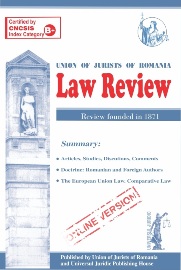National Security Exceptions in the WTO – A Carte Blanche for Protectionism? Part I – Introduction, Negotiating history of Art. XXI of GATT, Russia – Traffic in Transit Panel`s Report
National Security Exceptions in the WTO – A Carte Blanche for Protectionism? Part I – Introduction, Negotiating history of Art. XXI of GATT, Russia – Traffic in Transit Panel`s Report
Author(s): Mihai Ioachimescu-VoineaSubject(s): Law, Constitution, Jurisprudence, Civil Law, International Law, Public Law, Security and defense, Commercial Law
Published by: Universul Juridic
Keywords: Public International Law; trade law; World Trade Organization; national security exception; Art. XXI of GATT; trade war; trade protectionism;
Summary/Abstract: The security exception enacted in Art. XXI of the General Agreement on Tariffs and Trade has been contentious over the years. Parties have either argued that the security exception has a completely ‘self-judging’ nature, or that it allowed for a limited review by the panels and the Appellate Body, in accordance with the ‘good-faith’ principle. At first, states were reluctant to rely on the security exception provided by the General Agreement on Tariffs and Trade, or to refer the matter to the WTO dispute resolution system when other states relied on it. Even when panels were established under the General Agreement on Tariffs and Trade 1947 in respect to a dispute relating to the security exception, they usually had to act upon a limited mandate which hindered their possibility to examine the scope and limits of the exception. The debate over the extent of the ‘self-judging’ nature of the security exception lasted for more than seventy years, and it finally ended with the ruling in Russia — Measures Concerning Traffic in Transit. In this case, the panel asserted the jurisdiction over the security matters of states and provided a ‘roadmap’ to be followed in future examinations. The legal test devised by the panel consists of two parts. The first part is an objective assessment of whether there is a ‘war’ or an ‘emergency in international relations’ and whether the measures were taken during such state of affairs, according to subparagraph (iii) of Art. XXI of General Agreement on Tariffs and Trade. The second part consists of a two-prongs ‘subjective test.’ It involves a deferential review of the veracity of the state`s security interests and of the necessity of the measures adopted by the invoking state. In doing so, the panel will use a ‘sliding-scale’ test, which enables it to modify the degree of scrutiny based on the gravity of the ‘emergency.’
Journal: Law Review
- Issue Year: 2019
- Issue No: 02
- Page Range: 12-42
- Page Count: 31
- Language: English
- Content File-PDF

